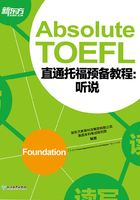
Part 2 Lecture: Multitasking
Vocabulary U5-V-L2
U5-V-L2


Vocabulary Exercises
I. Fill in the blank with the most appropriate word, pluralizing the word or changing the verb tense if necessary.
multitask waste error process bottleneck information partial context
switch interrupt accident device practice heavy habit
1. My suitcase is too_____. Could you please help me with it?
2. Please don’t_____me when I’m talking!
3. You need to hear the story in_____to understand it.
4. Smoking is a terrible_____. You really should quit.
5. I can’t see very well. Can you_____seats with me?
6. Luckily, no one was hurt in the car_____.
7. It will take one week for us to_____your application.
8. Sonja is_____for her singing performance tonight.
9. Could you show me how to use this electronic_____?
10. Give us all of the_____you have about what happened last night.
II. Match the word with its Chinese definition.

Lecture

I. Listen to a part of a lecture and check off the things that you hear the professor talk about. U5-L-P1
U5-L-P1
__task
__music
__guitar
__homework
__phone
__movie
__cook
__time
II. Listen to the following lecture and take notes if needed. U5-L-P2
U5-L-P2
_______________________________________
III. Select the correct answers for the following questions.
1. What is the main topic of the lecture?
a) how to be good at multitasking
b) the disadvantages of multitasking
c) the types of people who multitask
d) how multitasking affects students
2. What is the professor’s opinion of multitasking?
a) It only works for some people.
b) It does not work for anyone.
c) It works better if you have practice.
d) It works well for some tasks.
3. Based on the information in the lecture, do the following sentences refer to “processing bottleneck” or “context switching”?
Mark the correct box for each sentence.

4. Why does the professor mention using a cellphone while driving?
a) to show that hands-free devices are safe
b) to show that multitasking can stop accidents from happening
c) to show how multitasking affects reaction time
d) to show that using a cellphone while driving can lower IQ scores
5. What does the professor imply when he says this?
[So, about the same IQ as an 8-year-old.]
a) people who multitask stay younger
b) 8-year-old children are better multitaskers
c) to explain why car accidents are more likely to happen
d) to show that IQ of multitaskers falls to a child’s level
6. Which of the following is true about people who love multitasking?
a) They can multitask better than other people.
b) They are slower when they only work on one task.
c) They can organize their thoughts better.
d) They cannot multitask very well.
IV. Read the sentences. Are they true (T) or false (F)?
1. Multitasking allows us to get more work done in a shorter time._____
2. We are more likely to make errors while multitasking._____
3. A processing bottleneck is when the brain can’t focus on more than one thing._____
4. Context switching makes us miss important information._____
5. Context switching lets us move quickly from one task to another._____
6. Studies show it can take more than 25 minutes to return to a task after being interrupted._____
7. Using a cellphone while driving can make your reaction time four times slower._____
8. Heavy multitaskers are worse at multitasking than other people._____
Functional Vocabulary
